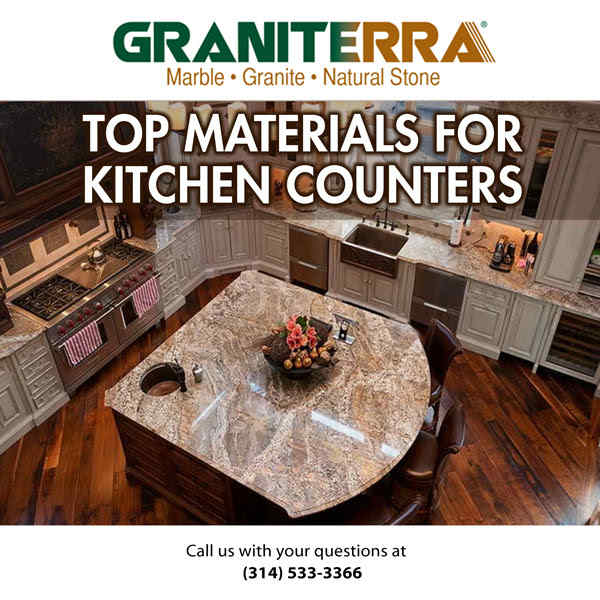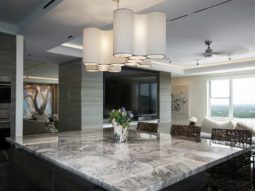 If you are updating your kitchen and ready for new kitchen countertops, you have more options available to you today than at any other time.
If you are updating your kitchen and ready for new kitchen countertops, you have more options available to you today than at any other time.
In this post, we review the top materials available for your kitchen counters, a brief description and the pros and cons to give you a starting point for your search.
Top 20 kitchen counter materials
- Granite
- Quartz
- Marble
- Corian
- Slate
- Travertine
- Limestone
- Soapstone
- Laminate
- Wood/Butcher Block
- Concrete
- Ceramic Tile
- Recycled Glass
- Paper Composite
- Bamboo
- Stainless Steel
- Aluminum
- Zinc
- Avonite
- Swanstone
Related: Gallery of natural stone countertops
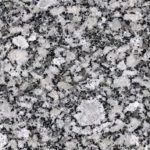 Granite
Granite
Pros: Granite remains the most popular countertop surface after decades of popularity. It adds a high-end finish to any kitchen and adds proven resale value to your home. It has few or no seams. It is natural stone and every slab is unique. Resists stains when properly sealed and very resistant to heat, cuts, and scratches.
Cons: Resealing is needed to fight stains. Edges and corners can chip.
Related: Three types of granite countertops
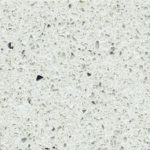 Quartz
Quartz
Pros: Quartz is an engineered stone that mimics the look of stone yet needs less maintenance. It has become extremely popular in recent years. It is highly resistant to heat, knives, scratching and abrasive pads. It can have patterns similar to granite and marble.
Cons: Edges and corners can chip.
Related: Quartz Countertops Guide and FAQ
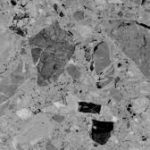 Marble
Marble
Pros: Marble is considered high-end but is a more affordable option than most natural stone. Their naturally cool temperature helps with temperature control. It is easy to clean, extremely durable and its beauty increases with age.
Cons: It is porous, can absorb stains and not scratch resistant.
Related: Marble Countertops Guide with Pros and Cons
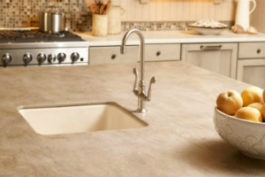 Corian
Corian
Pros: Corian is the most prominent “solid surface” acrylic polymer-based material for countertops. It is extremely durable, easy to maintain, stain, heat, and sunlight resistant. It comes in a variety of colors that do not fade or change from wear and tear.
Cons: Will not add monetary value to a home. Can be damaged by direct heat and sharp objects.
Related: The Advantages and Disadvantages Of Quartz, Granite, And Corian Countertops
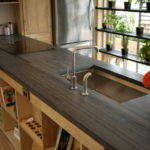 Slate
Slate
Pros: Slate countertops are nonporous and extremely durable. It is easier to clean and maintain than granite, concrete, or marble. Slate comes in a variety of colors and is more uniform than slabs of granite. It is resistant to heat and chipping.
Cons: Corners can be sharp. Corners can also be brittle and may chip.
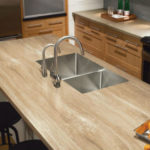 Travertine
Travertine
Pros: Travertine is a natural stone that is durable and long-lasting. (Did you know the Roman Coliseum was built with travertine?) It is generally less expensive than marble and granite. Travertine is an environment-friendly natural product.
Cons: It is porous and can react with anything acidic. Juice spills need to be wiped up immediately.
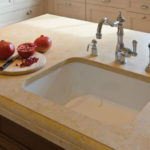 Limestone
Limestone
Pros: Limestone is a natural stone that is beautiful and adds value to your home with its elegant appearance. It fits in well with many styles, from modern minimal kitchens to classic kitchens alike. Limestone is usually less expensive than other natural stones.
Cons: Requires maintenance and care. Is not heat and scratch resistant.
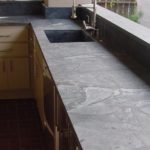 Soapstone
Soapstone
Pros: Soapstone is a beautiful natural stone that is nonporous, making it antibacterial, heat resistant, and stain resistant. Small scratches can be easily repaired.
Cons: Soapstone can nick, cut, and scratch easily. Some stains can be hard to remove.
Laminate
Pros: Laminate is a man-made material that is inexpensive, easy to install, stain resistant and are available in many colors.
Cons: Not considered highly desirable for resale value. It can peel, chip, and scorch. Because the base is particle board, it can make the countertop feel hollow.
Wood/Butcher Block
Pros: Wood and butcher blog give your home a warm look that is decorative and functional. It is great for food preparation when sealed and is sanitary even for chopping meat. It is budget friendly and eco-friendly but still heat resistant.
Cons: Wood can be damaged by water and stains over time. Requires sealing. Susceptible to scratching and scratches need to be oiled or sealed.
Concrete
Pros: Concrete countertops are custom made to your exact specifications and can be formed in unusual shapes. They have become trendy and can be found in high-end homes recently. Concrete is heat and scratch resistant. They can be color-tinted for many different exotic and unusual looks.
Cons: Because they are custom, they can be expensive. They may require reinforcement because of their weight. The material is porous and needs sealing.
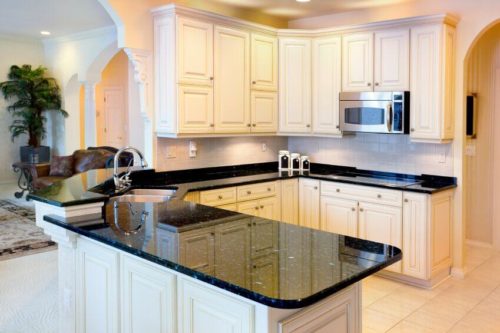
Ceramic Tile
Pros: Ceramic tile is durable, easy to clean, inexpensive, easy to clean, and available in a wide range of prices, colors, and designs. It’s an option you may be able to install yourself.
Cons: Many people don’t like the many seams and they can be uneven. The grout in-between tiles and will become dirty or can stain, requiring cleaning. Tiles can crack.
Recycled Glass
Pros: Countertops made from recycled glass can be cut into any size and shape. You have a nearly endless selection of colors and textures. Glass counters are easy to clean, non-porous and stain-resistant. They are also eco-friendly and made from recycled materials.
Cons: Glass countertops can be costly to produce and install. Sharp or heavy objects can crack or chip the surface and it is difficult to repair.
Paper Composite
Pros: Paper composite countertops are made from recycled paper and resin. They are non-porous, heat resistant, hygienic and environmentally friendly.
Cons: Require sealing and if not properly sealed can stain. Can only be cleaned with soap and water. Only available in medium and dark tones, so your design choices may be limited. The color tends to darken over time.
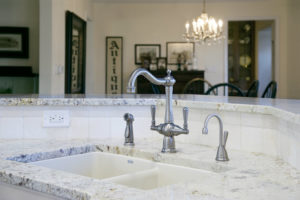
Bamboo
Pros: Made from an eco-friendly renewable resource that looks just like hardwood even though bamboo is actually a grass. Some bamboo varieties can be harder than hardwood. It is affordable and easy to install.
Cons: Bamboo countertops are expensive. It is not a heat-resistant or stain-resistant material. It requires continuous maintenance, such as coating the surface with beeswax at least twice a year.
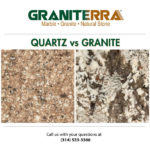 Stainless Steel
Stainless Steel
Pros: The material of choice for almost all commercial kitchens because it is hygienic and inhibits bacterial buildup. It is also very easy to clean and gives a modern, industrial look to a kitchen.
Cons: It is a very expensive material which is why it is not common in homes. Stainless steel can dent. It can out of place in traditional and many other styles of kitchens.
Aluminum
Pros: Aluminum counters are closer in appearance to quartz or solid surface than to stainless steel like you might expect. They can be eco-friendly and made from up to 97% recycled content. They can create a sleek, contemporary style.
Cons: Can be expensive and difficult to find. Aluminum can affect the way food tastes if the food sits on the surface for a long time. It can also change the appearance of food which is why it is not used in commercial kitchens.
Zinc
Pros: Makes for a great conversation piece because it is a “living metal” that changes color over time in reaction to its surroundings. Non-porous, easy to clean, and naturally anti-bacterial, making it a great countertop for prepping food.
Cons: Extremely expensive. Softer than stainless steel and easy to scratch. You must use a cutting board or it will scratch. Hot pans can warp or even melt the surface so you must use pot holders or cutting boards.
Shopping for countertops in St Louis area?
Call us today at 314.533.3366
 Graniterra is the leading supplier of granite and natural stone countertops in St Louis. With over 30 years in the stone business, we have the experience to deliver a perfect project, from design to installation. Request a quote
Graniterra is the leading supplier of granite and natural stone countertops in St Louis. With over 30 years in the stone business, we have the experience to deliver a perfect project, from design to installation. Request a quote
Additional resources about countertop materials
Top 10 Materials to Use for Kitchen Countertops – The Spruce
Our 13 Favorite Kitchen Countertop Materials – HGTV
5 Green Kitchen Countertop Alternatives – The Spruce
Best Countertops for Busy Kitchens – Consumer Reports
20 Kitchen Countertops: The Ultimate Cheat Sheet – The Spruce


